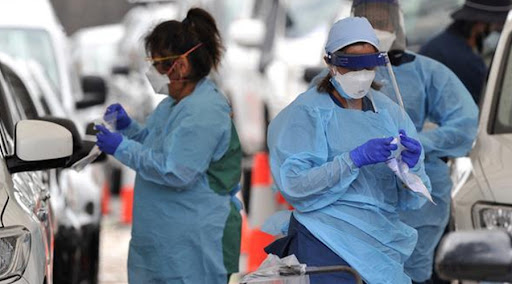Radio New Zealand reports today, Sunday, the number of people being treated for Covid-19 in hospital in NSW has topped 1000 for the first time since 2 October after the state recorded 18,278 new cases.
Hospitalisations have risen to 1066, up from 901 in the previous reporting period, with 83 patients in intensive care.
There are five times as many people being treated for Covid-19 in the state's hospitals as there were in mid-December, although the number of people in intensive care has increased at a slower rate.
Premier Dominic Perrottet last week said the health system "remains strong" and the state was in a "very strong position" despite the fast-growing case numbers and increase in hospitalisations because of the Omicron variant outbreak.
Tired and overworked healthcare workers in NSW were left with no choice but to support reducing the isolation rules for asymptomatic staff deemed close contacts of Covid-19 cases.
Under an exemption to the Public Health Order signed by Health Minister Brad Hazzard on Friday night, these staff can now be ordered back to work.
Australian Salaried Medical Officers Federation (ASMOF) NSW president Tony Sara said hospitals were running out of staff and the pressure on the system was enormous.
"We're loading our hospitals with Covid-positive patients who need to be in hospital," Dr Sara said.
"We therefore had to reduce the ISO requirements, we don't agree with it but essentially if the health system is not to collapse then ourselves, the nurses and the HSU [Health Service Union] - we don't have a lot of choice but to agree."
Shadow Police Minister Walt Secord said the turnaround from encouraging people to isolate to now trying to get them back to work was evidence of a stressed health system.
He said workers were exhausted and the Premier was completely unprepared.
"You have to put yourself in the situation of health care workers - nurses, doctors paramedics, even cleaners," Secord said.
"Rules are being quickly changed and without consultation and they're not been communicated, that's absolutely unfair but it also puts the community at risk."
NSW recorded two more Covid-19 deaths in the 24 hours to 8pm yesterday.
There were 90,019 Covid swabs taken compared to 119,278 taken during the previous reporting period.
Victoria records 7172 new Covid-19 cases and three deaths
Victoria has recorded 7,172 new Covid-19 cases and three deaths.
There are now 31,461 active cases of the virus, and 715 people have died in the current outbreak.
Hospitalisations have risen in the past day, from 451 on Saturday to 472 today, taking the seven-day average to 424.
The figure includes 52 patients in intensive care, with 22 patients on a ventilator.
The health department said a further 46 patients were in ICU but their infections were no longer considered active.
It marks the first decrease in daily case numbers for Victoria since 25 December.
However, testing figures dropped sharply over New Years Day, with just 48,252 test results recorded compared to 63,026 tests recorded on 31 January.
Testing sites were closed around the state due to hot weather conditions.
Tasmania records 404 new Covid cases, total of 1219 active cases
Tasmania has recorded 404 new Covid infections, taking the number of active cases in the state to 1219.
It follows 428 cases announced on Saturday and 137 cases the day before.
A total of 316 cases are being treated through the COVID@home, 60 are in community case management facilities and the rest are either still being assessed for those programs or have declined help to manage their symptoms and isolation.
In data announced on the Tasmanian Department of Health's Facebook page, almost 92 per cent of the state's eligible population aged over 12 are double vaccinated.
The government says three people are being treated in hospital - but none in intensive care.
There have been 13 deaths in Tasmania attributed to Covid-19 since 2020.
On Saturday, Premier Peter Gutwein said Tasmanians travelling outside the state should consider the "likelihood that your travel plans may be interrupted because you may become positive yourself while you're interstate or you may be a close contact".
"Your chance of bringing home Covid and giving it to family and friends is very real."
- ABC
Copyright @ 2021, Radio New Zealand
Yours sincerely
Frank Short



